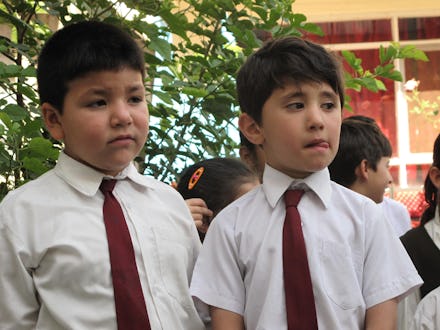Afghan Girls Are Choosing to Dress as Boys, and the Reason is Heartbreaking

For the bacha posh of Afghanistan, life is an open secret.
From the Dari language, bacha posh translates as a female cross-dresser, a girl "dressed like a boy." It also represents a small community of girls who pass as boys in Afghanistan, a country "that the U.N. says is the worst in the world to be born a girl, and where the average life expectancy of a woman is 44 years."
"Don't ask, don't tell" is a daily reality for the young children, who dress as boys in order to try to live fulfilling — and safe — lives in a culture that has historically offered much fewer options to its daughters and mothers. "It's a widely accepted and shared deceit in Afghan society, where the girls who live as boys exist just under the surface," journalist Jenny Nordberg told Mic. "The point is for girls to be able to disappear into a crowd or to move around outside without being harassed. As long as they are children, society silently condones the practice, my research has shown. It's not controversial until they reach puberty."
After interviewing dozens of bacha posh over a five-year period, Nordberg collected the stories of the girls in a new book, The Underground Girls of Kabul: In Search of a Hidden Resistance in Afghanistan, excerpts of which are available at the Atlantic and NPR.
"Afghan families have many reasons for pretending their girls are boys," Nordberg wrote in in the New York Times in 2010, "including economic need, social pressure to have sons and in some cases, a superstition that doing so can lead to the birth of a real boy. Lacking a son, the parents decide to make one up, usually by cutting the hair of a daughter and dressing her in typical Afghan men's clothing.
The stories she captures are of bacha posh at all ages, from 6-year-old Mehran to 15-year-old Zahra. Some of the girls never felt feminine, while others looked upon the act as an easy way to play soccer unmolested with friends in the streets.
Families craving the esteem associated with having male children delight in the masquerade, as Mehran's father told Nordberg: "I am very happy. When people now ask me, I say, 'Yes,' and they see that I have a son. So people are quiet, and I am quiet."
Image Credit: Jenny Nordberg
The practice is more common than one might think.
"Every single Afghan I have spoken to, except for those who have been abroad for a very long time and are essentially expatriates, they will know of someone," Nordberg told NPR. "In more conservative areas, there might be more. But every Afghan will know about this, and every Afghan has a story to tell."
Some bacha posh, finding comfort and privilege in cross-dressing as boys, refuse to return to being girls once puberty hits. And who could blame them? Why would they want to give up school, sports, friends and potential careers to return to a gender identity that is systemically oppressed?
"People use bad words for 'girls,'" Zahra tells Nordberg. Her parents beg her to be more feminine, but Zahra sees what life is like around her for her peers. "They scream at them on the streets. When I see that, I don't want to be a girl. When I am a boy, they don't speak to me like that." The 15 year-old has aspirations of becoming a journalist and a politician, neither of which are particularly safe choices for a woman in a country where only a small portion of parliament seats are set aside for female candidates, and where political advocacy is still met with open hostility and even death threats.
Nordberg told Mic that it "often happens that a bacha posh will refuse to change into a girl around puberty." But ultimately, her parents decide her fate. "Some women do manage to remain in male disguise their entire lives," she said, "and in essence will 'become' a man and pass over to the other gender for good, in how they've described it to me."
Likewise, she said, "[g]rowing up as a gender other than your birth sex does not automatically mean that you'll develop a certain sexual orientation as an adult. Officially, homosexuality doesn't exist in Afghanistan, but of course it in fact does. However, I know there is no direct link to the practice of bacha posh, which primarily is a very human quest for basic freedoms in an extremely segregated society, and not about sexuality or sexual preference."
The "trans-ness" of these children is born out of the psychological implications of Afghan culture's resentment of the female gender, a sort of inevitable outgrowth prompted by "a segregated society so dysfunctional that it inevitably must change," Nordberg told Mic. In other words, these children wouldn't hate being girls if society didn't hate girls in the first place.
Image Credit: Jenny Nordberg
Ultimately, this is a universal story of oppression, and how women have struggled to live within that oppression. Nordberg explained to Mic that she only sees a cultural shift possible if and when the country becomes more peaceful. "I think for women's rights to make real progress in Afghanistan, there needs to be an extended period of peace and security. War closes society and makes it more conservative, and women are the first to suffer from that."
While her book is set in a specific context, the problem resonates in any context where women have sought freedom. Even the United States, Nordberg said, had women who "joined the Civil War as men because women were not allowed to get an education, to become doctors."
"When one gender is so suppressed and so unwanted," she said, "there will always be those who try to pass over to the other side, to reach for the small freedoms every human should have."